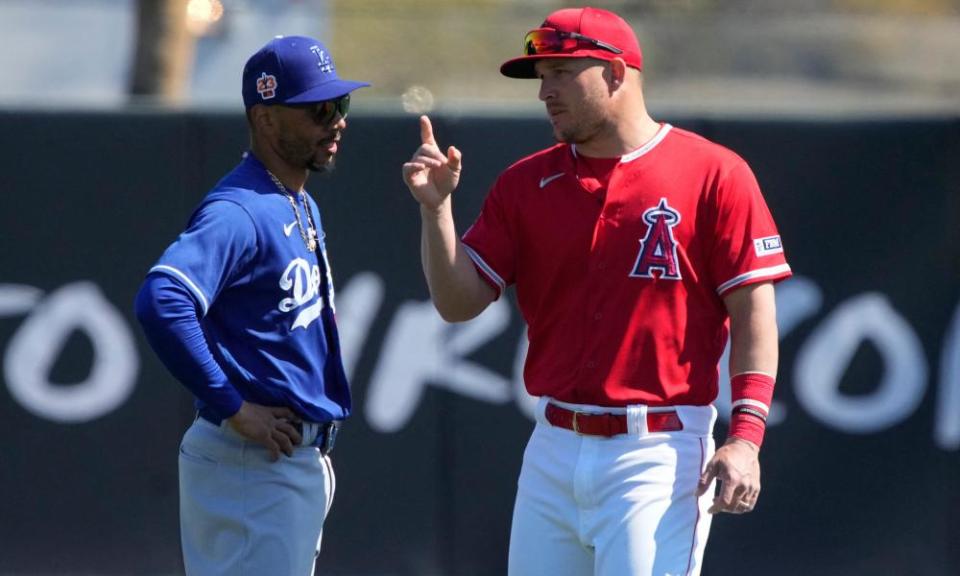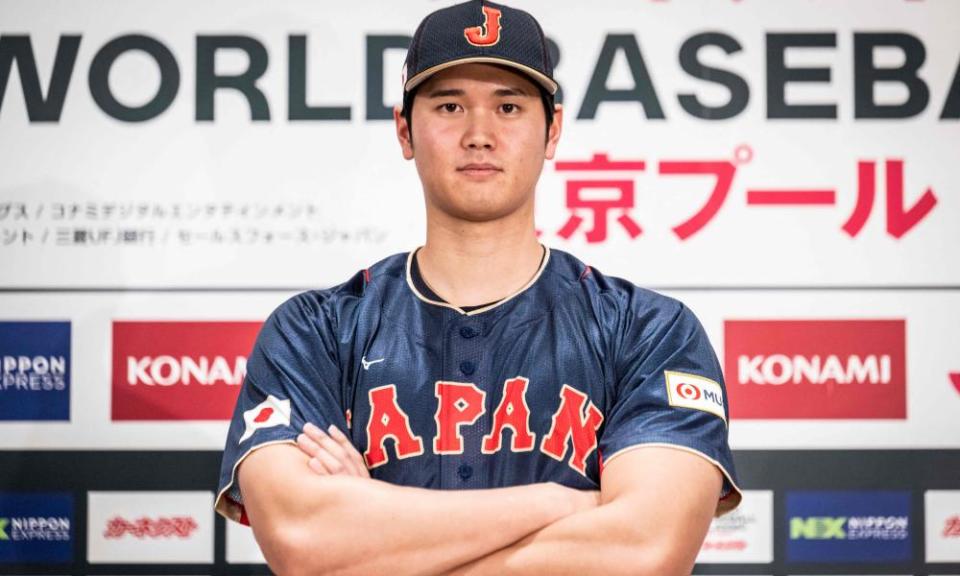Why is the US finally treating the World Baseball Classic like a World Cup?

There’s something different about the lead-up to the World Baseball Classic (WBC) this year. Don’t take a writer’s word for it – the players themselves have noticed. “The hype is a little bit higher this time around,” according to Nolan Arenado, the St Louis Cardinals’ All-Star third baseman. “There’s more guys that want to [play on the US team this year].”
Arenado would know – he’s one of the few holdovers from the US team that won the previous tournament in 2017 (the 2021 edition was cancelled owing to Covid). Arenado’s teammate on the Cardinals, reigning National League MVP Paul Goldschmidt, was also on the 2017 squad. Possibly even more importantly, Goldschmidt may be one of the reasons for the increased interest in the WBC among Major League Baseball players.
“I’ve said it before, [playing in the WBC] is one of the greatest baseball experiences I’ve ever had,” Goldschmidt said in a Zoom call last month. “I was recruiting as many guys as I could to get back on the team or play in other countries because I thought it was so great.”
Increased interest from players is not the only sign that the WBC is having a moment. This year’s tournament, which begins on Wednesday when Cuba face off against the Netherlands, features an expanded field of 20 countries, which accounts for the presence of teams such as Great Britain and the Czech Republic. And, for the first time since the 2009 edition, fans in the US can watch English-language coverage of the WBC on network television, rather than the less widely available MLB Network. Such increases in visibility seem long overdue.
Despite its status as America’s pastime, baseball is an undeniably global sport in a similar vein to cricket and rugby, both of which are widely seen to be “international” in nature compared to baseball. (Cricket’s predominance in populous countries such as India, Pakistan and Bangladesh, however, means that it still dwarves both baseball and rugby in terms of absolute number of fans). Baseball is the national sport of Japan, Cuba and the Dominican Republic (among others) and is popular in places ranging from Korea to Curacao to Mexico. Yet, while the Rugby and Cricket World Cups have long been viewed as major international events, the WBC has always been a relative minnow.
Founded in 2006, the WBC is younger than YouTube, and, 17 years into its existence, the competition only now seems to be finding its feet. The WBC’s rocky launch can be partly attributed to the fact that that, until 2011, it jockeyed with the much older Baseball World Cup (founded in 1938) to be seen as the premier international baseball competition. Even after the Baseball World Cup was discontinued in 2011, however, the WBC still failed to capitalize on its status.
The tournament’s prolonged plateau is at least partly ascribable to the fact that US teams have always struggled to attract top-tier talent. Even the 2017 championship-winning side featured a less decorated lineup than this year’s team. For example, USA’s Marcus Stroman was named the MVP of the 2017 WBC tournament and, while obviously talented, Stroman is a one-time All-Star who has never been among the very best players in MLB (Stroman, whose mother is Puerto Rican, will represent Puerto Rico this year).
This year’s US team, however, includes multiple former MVPs and MLB is promoting this team as the “most star-studded United States roster in the history of the World Baseball Classic.” (It’s worth noting that it is in MLB’s interest to promote the team as such – MLB runs the WBC). While this year’s team is of an inarguably high calibre, it is probably more accurate to say that the 2023 American team features the most distinguished lineup since the inaugural WBC in 2006.

The 2006 American team included some of the most prominent players in baseball history, ranging from Hall-of-Famers such as Ken Griffey Jr, Chipper Jones and Derek Jeter to household names like Alex Rodriguez and Roger Clemens. Yet, despite having an all-time great lineup, the 2006 US team finished eighth in what was widely considered a national embarrassment.
This underperformance informs one theory explaining the subsequent drop-off in overall talent signing up to US sides in later WBCs – players didn’t want to suffer similar embarrassment. “Team USA had never won, [before 2017]” Goldschmidt said. “A lot of guys had a chip on their shoulder.”
It is similar to the reason why the very best NBA players often don’t play on the Olympic basketball team– there’s seemingly little to gain. If the US win, they’ve simply done what they’re supposed to do. Should they lose, even to a talented side, they have underachieved. “We were able to [win the WBC in 2017],” added Goldschmidt. “Hopefully, that showing motivated more guys, whether it’s with USA or other teams.”
One superstar motivated to participate for the first time this year is Los Angeles Angels outfielder Mike Trout, a 10-time All-Star and three-time MVP. Trout committed to the team early (in July of last year) and, with such a big name already on the roster, it was easier to convince other players to join the effort.
“The fact that he said ‘I’m in’ very early on, my conversations [with other players] started to be easier and easier,” said Tony Reagins, the US team’s general manager. “He was definitely a catalyst to all this.”
“Reagins did an unbelievable job getting [Trout] and there was a trickle-down effect with … Mookie Betts,” added head coach Mark DeRosa, mentioning two of the former MVPs on the US roster this year.
One other, less obvious reason for the increased interest may simply be an accident of timing. Last year’s Fifa World Cup seems to have played a part in encouraging US players to participate (American viewership of the 2022 World Cup was up 30% over the 2018 edition). “Watching the World Cup and how awesome that was just to represent your country,” said Arenado. “I don’t know if it will get quite there, but get it close at least.”
Whatever the reasons for the surge in participation, the US team competing in this year’s WBC is flush with MVPs and All-Stars. Even the team’s assistant coaches are legends of the game – Griffey Jr is the batting coach and New York Yankees legend (and five-time World Series champion) Andy Pettitte is looking after the team’s pitchers. So talented is the US team that casual observers might assume that the Americans are favored to win it all. They are not.
It is a testament to the strength of baseball’s global talent pool that, despite the US team’s depth, Las Vegas considers baseball superpower the Dominican Republic to be the tournament favourite. The Americans have the second-best odds of winning it all, although the US team are only slightly favoured ahead of Japan, who are led by Trout’s teammate on the Angels and fellow former MVP, Shohei Ohtani.
It’s not just the US, the Dominican Republic and Japan, however, that are putting up especially talented squads this year – teams throughout the tournament are littered with top-tier MLB players. The Venezuelan team features two former MVPs in Miguel Cabrera and Jose Altuve, and Canada has its own former MVP in Freddie Freeman. Altogether, more than half of the players nominated to the All-Star game last season will play in this year’s tournament.
This saturation of talent across the board, however, doesn’t mean the reigning champion US team’s objectives have been diluted. “[That’s] the whole reason I signed up: trying to win this thing,” Trout said earlier this year. “There is nothing else. Anything else is a failure.” This year’s team might not win it all, but at least they seem comfortable bearing the weight of expectation that comes with representing US baseball.

